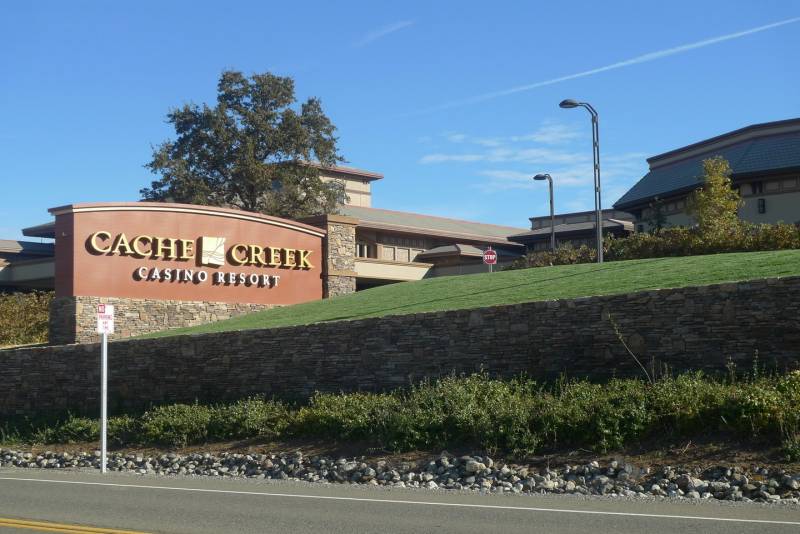Two years ago, state legislators tried, but failed, to forge a compromise to legalize sports gambling, with one lawmaker likening the process to “trying to solve Middle East peace.”
Now, voters are left to arbitrate.
Proposition 26, backed by dozens of California tribes, would allow sports betting, but only in person at casinos on tribal lands, along with a handful of horse-racing tracks — not online. It would also fulfill a pair of longstanding tribal goals by allowing tribes to sue cardrooms and other venues over specific games they are offering, instead of waiting for state investigators to take action, while also sanctioning dice games and roulette at tribal casinos (which currently are not allowed).
Tax revenue on profits would mostly flow into the state’s general fund.
Under the second measure — Proposition 27 — online gaming operators like DraftKings, FanDuel and BetMGM, who are seeking to legalize online and mobile wagers in California — would have to partner with an Indian tribe, with 85% of tax revenue earmarked for statewide housing and homeless services.
Chris Grove, partner emeritus at Eilers and Krejcik Gaming, an Irvine-based research and consulting firm, described the ballot fight as “fairly close to existential territory for the primary parties involved.”
Digital gambling operators need access to California’s market to continue to show growth for investors, said Grove. And for tribal governments, the addition of craps and roulette is of similar importance.
The Proposition 26 campaign has raised the stakes by hitting the airwaves early to sell its message. In campaign filings through March, the tribal coalition reported spending $14.7 million on TV airtime and production costs — the vast majority on ads that attack the mobile gaming measure for attempting to “break the promise” between the state and tribes.
“We’re laying the foundation, if you will, for voters,” said Kathy Fairbanks, a spokesperson for the Coalition for Safe, Responsible Gaming. “We think that [Proposition 26] is the more responsible approach to sports betting in California because it is highly regulated. You can ensure that people who come to bet are 21 or over. You can physically check their ID, look at the person face-to-face.”
With large campaign war chests on both sides of the sports-betting debate, some political consultants think spending could surpass the current high-water mark: the $224 million spent by the campaigns supporting and opposing Proposition 22, the 2020 initiative that exempted companies such as Uber, Lyft and Instacart from state labor law.
“I just think we’re going to see record, record numbers of how much money is spent specifically on these ballot measures,” said Marva Diaz, a political strategist and editor of the California Target Book. “What I don’t think people are understanding is that the [TV ad] purchasing time is already started, so the time for October, September, August, they’re already being bought up.”
“So is it normal? Not necessarily, but it’s smart,” Diaz said of the early spending. “If you’re a ballot measure committee that has a very complicated issue, you’re going to use every single moment to try to educate the voters.”
The Proposition 27 campaign, meanwhile, has amassed more than $100 million from commercial operators around the country.
“We’ve got a long campaign to go,” said campaign spokesperson Nathan Click, noting that TV and digital ads will be rolling out in the coming weeks.
In states that have legalized sports gaming, mobile betting has proven far more popular — and lucrative — than in-person wagering. As a result, Proposition 27 is likely to bring far more tax revenue into state coffers than would Proposition 26.
Analyses done by the California Legislative Analyst’s Office found that while state revenue from Prop. 26 “could reach the tens of millions of dollars annually,” the tax windfall from Prop. 27 “ could reach the mid-hundreds of millions of dollars annually.”
“Our initiative is the only one that will raise hundreds of millions of dollars each year that will go directly to help solving one of our state’s most desperate challenges,” said Click. “And that’s homelessness and mental health support.”
The spending blitz by the two sides might not stop on Election Day, either. Wallach, who has testified about sports betting in the state Legislature, said a legal showdown could ensue if both measures pass in November.
“The existence of a conflict … on the face of the ballot initiatives will lead to litigation after Election Day,” he said.
In the next four months, Wallach said, campaigns need to convey to voters that the measures “are, in fact, mutually exclusive — it’s one or the other.”

